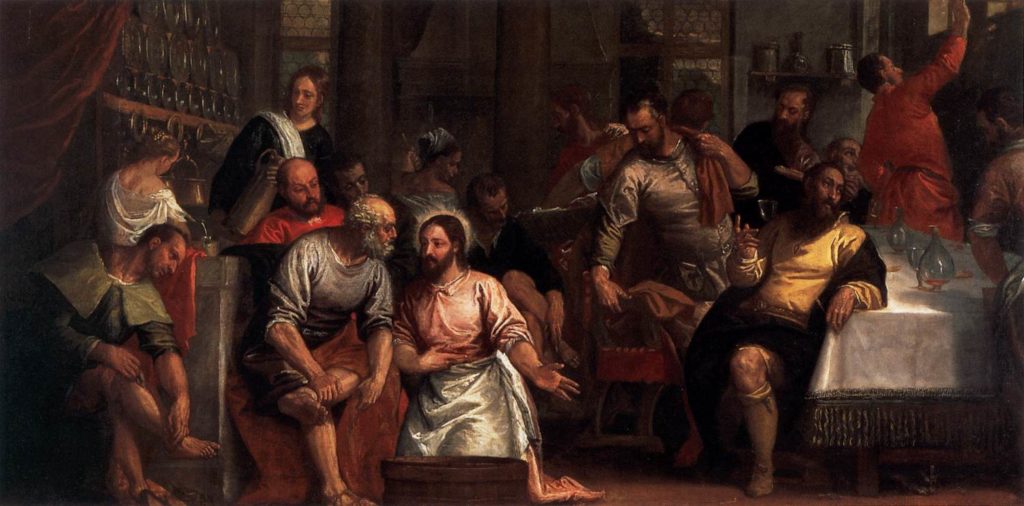Thoughts on Sunday’s Lessons for Oct. 21, 2018

“For the Son of Man came not to be served but to serve.” Christ Washing the Feet of the Disciples (1580s), oil painting by Paolo Veronese (1528-1588). National Gallery in Prague. (Click image to enlarge.)
First Reading (Track One): Job 38:1-7,34-41
In last week’s Track One first reading we heard Job loudly lamenting his condition, looking for God and angrily demanding that God come out of hiding and hear him. Now Job gets his wish, but God’s response may not be what he had expected. A mighty, powerful God speaks to Job out of a whirlwind and quickly sets him quite literally in his place. “Where were you when I laid the foundation of the earth?” God thunders, hurling poetic words at Job like thunderbolts. “Tell me, if you have understanding.” God has created a wonderful universe, full of beautiful creation; but sometimes creation stands in conflict, when a lion seeks its prey or when young ravens go hungry.
First Reading (Track Two): Isaiah 53:4-12
If you want to be in charge, be careful what you wish for. Throughout Sunday’s readings we hear of servant leadership, sacrifice, and walking humbly with our God. Isaiah’s “Suffering Servant,” who we meet often in our readings (most recently only last month) may make us think of Jesus in his willing sacrifice to bear the sins of many. In its original context, though, Isaiah writes of the servant’s suffering in the past tense, remembering Israel itself as the servant, the sacrificial pain of its sad exile now finally come to an end.
Psalm (Track One): Psalm 104:1-9,35, 37c
Echoing God’s extended response to Job, this hymn of exaltation worships God as creator of the universe and as ruler of all creation, whose mighty works fill us with awe. It envisions God clothed in majesty and splendor, wrapped in a cloak of light that crosses the heavens. God rides across the world on the wings of clouds, spreading out mountains and valleys, oceans and rivers, setting the earth immovably on its foundations and separating the land from the water.
Psalm (Track Two): Psalm 91:9-16
We will chant only the second half of Psalm 91 on Sunday, but it is worth taking a moment to read the entire psalm. (You can find it in the Psalter, Pages 719-20, BCP). In verses 1-9 we hear of another servant who suffered, yet who received God’s protection against illness and enemies. In the verses that we pick up today, the Psalmist assures us that we can find protection by seeking refuge in God, when we pray as Jesus taught us, “deliver us from evil.”
Second Reading: Hebrews 5:1-10
These verses from the letter to the Hebrews presents Jesus as the perfect high priest, a new high priest with a new covenant and new sacrifice. But this high position did not come easily. Because Jesus was fully human, he was not immune from suffering; he suffered “with loud cries and tears.” He learned obedience through his suffering, even as God’s own Son. Thus he became the greatest of the line of priests that began with King Melchizedek, the first high priest named in Genesis. As the perfect image of God, Christ earned salvation for us all.
Gospel: Mark 10:35-45
Immediately before today’s Gospel, the apostles have just heard Jesus tell them for the third time that when they reach Jerusalem he will be arrested, flogged, killed, and will rise again. And now, also for the third time, we hear some of them responding with remarkable cluelessness. James and John “the Sons of Thunder,” who we recently heard complaining that other people were casting out demons in Jesus’ name, now demand, more than request, that Jesus let them sit at his right and left hand in God’s kingdom. One more time, Jesus sets the apostles straight: To follow Jesus we must be servants, not those served; if we wish to be first, we must be the slave of all.
What are “Track 1” and “Track 2”?
During the long green season after Pentecost, there are two tracks (or strands) each week for Old Testament readings. Within each track, there is a Psalm chosen to accompany the particular lesson.
The Revised Common Lectionary allows us to make use of either of these tracks, but once a track has been selected, it should be followed through to the end of the Pentecost season, rather than jumping back and forth between the two strands.
For more information from LectionaryPage.net, click here.
